Another Timbre TimHarrisonbre
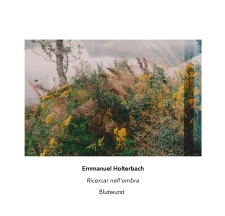
at151 Emmanuel Holterbach & Blutwurst - ‘Ricercar nell’ombra’
A 46-minute piece composed by Emmanuel Holterbach in collaboration with the Italian ensemble Blutwurst:
Cristina Abati (viola) Marco Baldini (trumpet) Maurizio Constantini (double bass) Daniela Fantechi (accordion)
Michele Lanzini (cello) Edoardo Ricci (bass clarinet) Luisa Santacesaria (harmonium)
‘Ricerar nell’ombra’ was developed during Bluwurst’s residency at Tempo Reale, at SpazioK Prato and SBA+C, Florence.
Interview with Emmanuel Holterbach
Tell us about the 'ricercar nell'ombra' project. How did it start, what does the
title refer to, and how was the piece developed with Blutwurst?
Meeting Blutwurst
was like a shooting star appearing in the night sky… They loved my work, I loved
their work. So make a choice: become friends or work together. We actually did both.
Blutwurst
are based in the beautiful city of Florence and had good connections with Tempo Reale
(an organization for contemporary music research founded in the 1980’s by Luciano
Berio). This is where we were able to start work together during a three-week residency
back in May 2018.
I come from an art background and turned at an early age to sound
art back in the 90’s (sound installation, noise performance, inventing instruments).
I’ve worked as a musique concrète composer since early 2000, so I was confused when
they proposed that I should compose a piece for them. I actually don’t have a clue
how to write a score - I don’t even read notes! But they do, so I started to consider
strategies of collective work…
In my electroacoustic work, there are a lot of cycles,
embroideries, loops into loops into loops into loops of various length, creating
hypnotic swell effects. I immediately thought that would be an interesting way to
start. Cycles of tones played by skilled musicians - and that’s what Blutwurst are!
On
the other hand, I have a love affair with Italian music, especially ancient, medieval
music, through to Baroque, and on to the experimental music of the 60’s and 70’s
(Giusto Pio, Roberto Cacciapaglia, Marino Zuccheri, Teresa Rampazzi and Gruppo NPS,
Enore Zaffiri, Franca Sacchi - thank you Die Schachtel for bringing most of these
to light). So I wanted to make a humble and sincere homage to the Italian musical
tradition.
There was also this beautiful composition, « Ricercar III » by Francesco
Guami, a composer from Lucca in Tuscany who worked during the XVI century. The first
seconds of this piece fascinated me, seven notes whirling in a gorgeous, simple melody…
blooming. So this is where things started: if the notes of this melody created such
a beautiful state of contemplation, what if we started stretching them, permutating
them, and created a large structure out of them? The intuition was good and turned
into a fertile soil for our collaboration to blossom.
Then we talked about important
things.
I walk and hike a lot. Walking in the landscape is a basis of my musical thoughts
(and also in my life). Experiencing the subtle variations of the ground, minerals,
vegetation, lichen, mushrooms, from lakesides to mountains, from forests to large
plains, valleys, shores. And also the tensions in the air, meteorological events,
the strength of tectonics…all these elemental considerations titillating and happening
in your mind when you start experiencing the great outside, in whatever wild and
solitary places still remain.
How to create with music an experience of the deep,
of the large forces surrounding us everywhere, every day, at all times?
We also talked
about the ancient tradition of scroll painting in Japanese and Chinese culture, especially
the long horizontal scrolls, where you can get lost into contemplation, wandering
on painted paths.
All these elements were sources of inspiration for this collaborative
work.
Then we worked together a lot. It was more like the process of painting a canvas.
While the seven musicians were playing these seven notes as long tones embroidered
together, I was influencing the way that energies and tension should appear on this
large sound geography.
At some point in the work, the balance of the piece started
to be almost an hour in length, which was impressive!
Then the Blutwurst musicians
began to draw a more precise score and organisation of events for proper interpretation.
It was a very interesting way of composing together.
I wanted the composition to have
intense parts, like a thunderstorm or high mountains. I also wanted to have forests
and valleys, silence and shadows. This is how the title popped out, a combination
of ricercar (research) and ombra (shadow).
Can you tell us about your background in
experimental music? How did you come to it, and where are you based?
I could tell
you so much about the pleasant journey I had in the French underground and my love
of records, and all the inspiring composers I’ve been lucky enough to meet during
all these years. I could also talk about my long-term relationship with Eliane Radigue,
helping her to gather, organise and publish her archive works and biography… But
maybe it would be boring?
Or maybe things are more simple. Maybe I am very sensitive to the sounds surrounding
me since I was a child and have a great satisfaction just listening to various phenomenon
(natural, electrical, mechanical, radio, etc). Maybe all the walks in the wild, mountain
hikes, and wandering around were so inspiring, and these are the places where my
mind and perceptions can blossom, flourish and bring intuitions into the field of
consciousness.
Maybe I understand the vocabulary of wind, streams, rocks, living beings
a bit more comfortably that the vocabulary of civilization?
Maybe my background in experimental music takes root at the same place were poetry
feeds me, in the experience of everyday reality (I don’t read a lot of imaginative
poetry, more contemplative poetry about everyday phenomena). Because I don’t feel
like things should be « invented » (are we even able to invent?), or maybe I’m not
really impressed by imagination. Everything is already here, magic and intense and
fascinating and wonderful in the world as we perceive it. Stranger, stronger than
anything we would be able to invent. Then my only aim is to find a proper vocabulary
to express what I experience (if I am touched by this, and I know I am not that unique,
then someone else will probably be touched too).
Is this experimental?
Also, I am very
playful and have always lived under the official poverty threshold (I’m ok with this,
it’s a choice). So I like to work with cheap devices and equipment, and it’s an interesting
game to make these sound large and strong and intense. This is also why I have designed
some of the instruments I use (like enharmonic glasses, or other electronic devices).
Field recording can be so satisfying, as can both analogue and digital electronics.
The studio, as an instrument, is a grotto of miracles.
But I must say that leaving
these solitary paths for a while and working with musicians was really a great pleasure.
I
grew up in eastern France (Metz & Strasbourg) in post-industrial surroundings, then
I lived for ten years in the mountains round Grenoble. Now I live in Lyon, close
to the Saône river, which breathes every day in a different way.
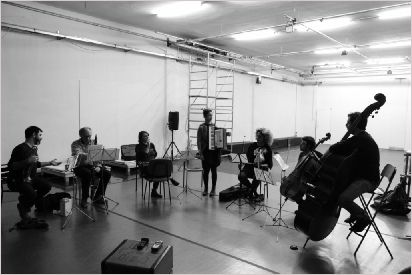
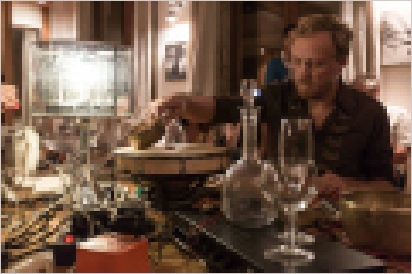
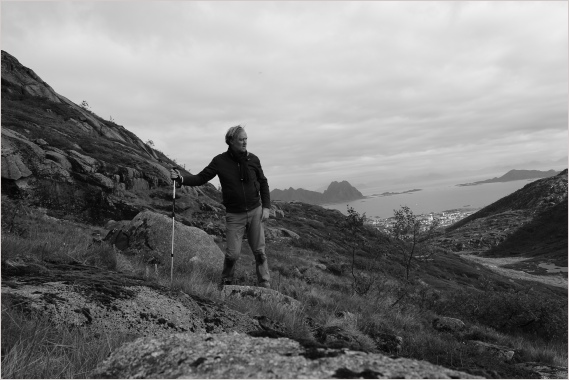
Emmanuel Holterbach, photo Jules Roeser
Blutwurst rehearsing
Blutwurst in concert
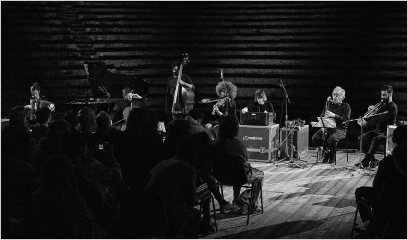
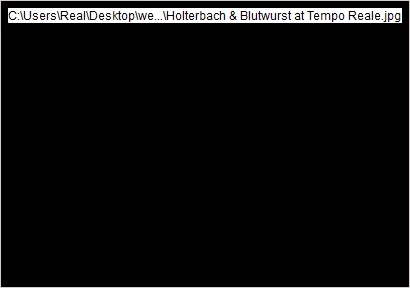
Blutwurst & Emmanuel Holterbach at Tempo Reale